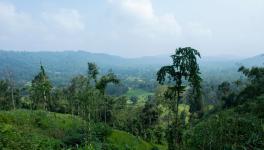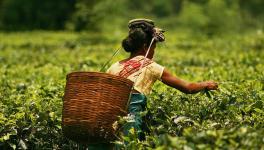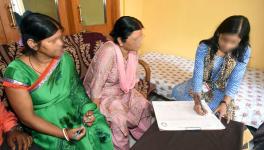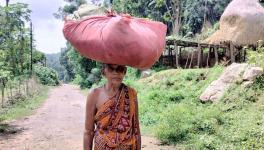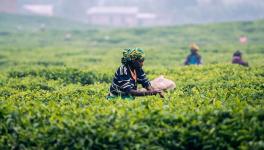Even as Pandemic Rages on, Health Care in Shambles inside Tea Gardens
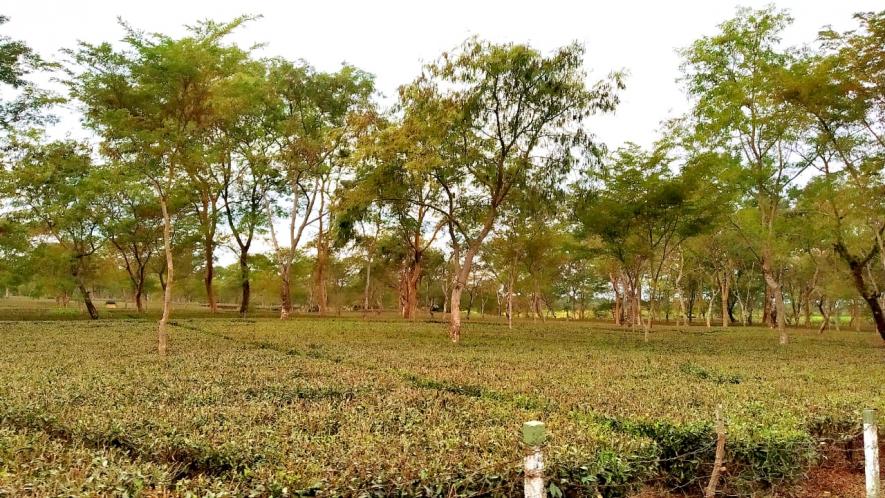
“sara dine kam kari, khun ke pasina kari
chale jai jivan hamar, haye re boro dukhe go”
(All day I work, turn blood to sweat
Life is thus spent, in deep sadness)
Dulal Manki, in this Jhumur song, expressed the toil of the daily lives of the tea garden workers. Jhumur is a form of folk practice of tea tribes in Assam, which has become a part of the Assamese culture. Dulal Manki's lines from the Jhumur aptly paints the agonies and pains of tea gardens workers across generations.
The colonial regime in India brought organised tea cultivation to Assam and forced people to migrate from places like Jharkhand and Odisha, who were then settled as tea garden workers. Since then, for more than a century, they have been plunged into the mire of distresses—poor working conditions, pathetic health conditions, feudal and patriarchal practices, among others. No doubt, a section of the tea tribes in Assam has outshined in their lives despite all of these, but the majority still spends their lives earning daily bread and butter. Here we take the opportunity to pay tribute to Sananta Tanti, an inordinate poet and a Sahitya Academy awardee, who breathed his last recently.
Visiting tea gardens in Assam to look at the health care facilities available there, one experiences not only the pathetic health scenario but also several ignominious practices. Bargang tea estate, owned by Goodricke, is a large tea garden in the Behali area of Biswanath district in Assam. The huge garden, sprawling over about a thousand hectares, has three divisions: Rangagarha, Borbeel, and Borgang.
Dr Chinmayee Kakati Bora, the Senior Medical Officer (SMO) at the Rangagarha division hospital of Bargang Tea Estate, told Newsclick that it was the largest health care facility in the tea garden and had an IPD (In-Patient Department) with a capacity of 45 beds. She told us that the other two divisions--Borbeel and Bargang--also have one hospital each but fewer facilities. Dr Kakati and her husband are appointed tea garden doctors in the Bargang tea estate. "The Rangagarha division hospital has two ANM (auxiliary nurse midwife) and two GNM (general nurse midwife) nurses apart from us," Dr Kakati told Newsclick.
Probably the two other divisional health care set-ups also have at least one doctor each. Counting the total number of people these little facilities have to cater to will be around 12,000. The patients include the workers in the tea gardens and their families to a limited age. In emergency cases, the patients are provided with an ambulance to shift to other advanced hospitals like the district (civil) hospital or Tezpur Medical College & Hospital at Tumuki. Notably, Tumuki, with some modern health facilities, is over 100 kilometres from Behali.
Dr Kakati told us that during the COVID-19 waves, especially in the second one, there were 64 positive cases in the garden. However, there were no additional health care provisions during the peak periods of COVID-19 waves other than testing and vaccinations. However, the vaccination drive was conducted in coordination with the district administration. The positive cases were transferred to nearby CCC (Covid Care Center) or Covid designated hospitals for serious patients. Dr Kakati told Newsclick that the prevalent diseases in this garden were similar to that of others, such as tuberculosis, skin diseases, anaemia and chronic liver diseases.
From the Bargang tea estate, the nearby large garden is the Monabarie tea estate in Behali. Owned by McLeod Russel and a part of the Williamson Magor Group, the Monabarie Tea Estate is claimed to be the largest in Assam and the world. The Monabarie Tea Estate has four divisions: the Old-line, Newline, Laharijan, and Behapukhuri. When Newsclick arrived (January 5, 2022) at the Monabarie hospital, supposedly the largest in the tea estates, there were no doctors on the premises. The doctors here are a husband-wife duo, and both were on leave. The absence of all the doctors could be a significant problem in emergency cases. In the situation where both the doctors belong to the same family, and both of them go on leave, then the hospital becomes
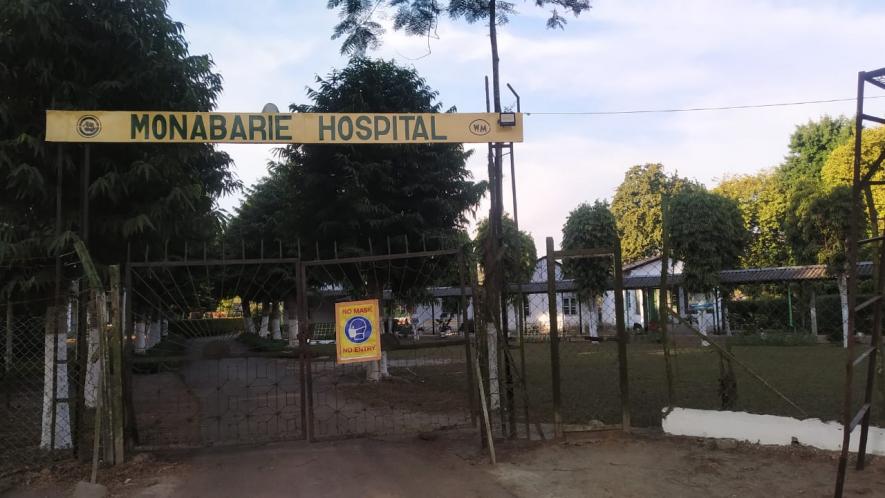
The hospital inside the Monabarie Tea Estate, the IPD section.
nearly paralysed. Newsclick could not obtain much information about the special provisions arranged by the hospital during the COVID-19 waves. However, on the day of the visit, Newsclick met Bangshi Talukdar, who is counting his days for retirement after providing services to tea gardens for years. According to him, the Monabarie hospital was once a central tea garden hospital with X-ray and Ultrasound sonography facilities, etc. Due to its major hospital status, the Monabarie hospital witnessed patients from other tea gardens along with occasional visits from specialist doctors. However, this is no more a central hospital; only some minor operations can be done in the facility. Talukdar conducts the X-ray and sonography at the hospital. Like other tea gardens, TB, anaemia, and Filariasis are endemic inside Monabarie.
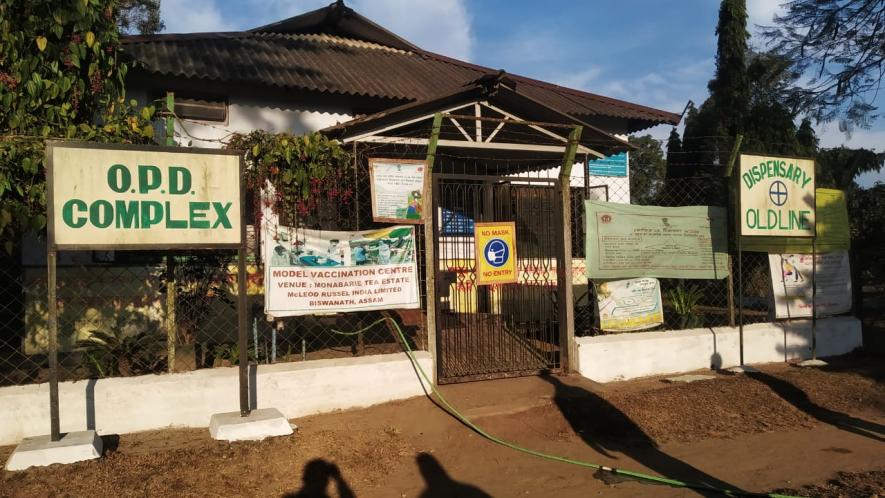
The Monabarie Hospital, the OPD Section.
Ignominious Practices and Saga of Exploitation:
Forget about advanced health care, a sensitive pandemic response, or even other amenities of modern days; it is mere survival for which the workers strive. Since the colonial regime, the saga of exploitation continues, coupled with reprehensible practices.
The tea gardens in Assam have two categories of workers—permanent and contractual (which is called 'Faltu' by locals).
The criteria of division between permanent and contractual or temporary are also based on inheritance, explained by Lakhikanta Kurmi of Behali. Kurmi is a middle-aged man whose ancestors used to work in tea gardens. His father was born in the Borbeel division of the Bargang Tea Estate, and both his parents worked there. Kurmi came out of the tea gardens, and after much struggle, he now has a small tea garden of his own. Kurmi told Newsclick, "The permanent are those whose ancestors worked in a tea garden and after the retirement of his parent the job goes to him. The 'faltus' are those who did not have their ancestors in the tea garden (they may have worked in some other gardens also)."
"As of today, the workers get 205 rupees as daily wage, which includes PF as well. So the actual money in hand is below 200. The workers earn around 5,000-6,000 rupees a month. Although they get rations and a box of tea (labour tea) per month, the meagre amount of money is just enough to keep yourself alive," Kurmi said.
"The workers have the provident funds, but at the time of retirement, they don't get much money to start something of their own," Kurmi sighed. Other workers in other tea gardens put forth exactly what Krumi said.
The tea garden authorities claim to provide health facilities to its workers where they are granted health leaves of 14 days per year. This means whoever is registered with a health condition in the garden hospital should get the full daily wage of those 14 days. However, things do not work that way on the ground.
Ghanashyam Munda, the Dibrugarh secretary of the Assam Sangrami Chah Shramik Sangha, a union of tea workers of Assam, said that workers get two-thirds of the daily wage when remaining absent for health condition. Munda's activity is based in the Maijan Tea Estate in Dibrugarh district (Dibrugarh belongs to another tea belt of Assam in the south bank of the Brahmaputra.)
While speaking to workers of different tea gardens in Assam, Newsclick spotted a routine practice that made us remain flabbergasted. A permanent male worker will get health facilities for his family, including his children (up to 18 years of age) and wife, even if they are temporary or contractual. But surprisingly, the reverse is not true -- a permanent female worker will not get her husband's health facilities free if he is temporary. Ghanashyam Munda said, "This is utterly a patriarchal practice. The tea gardens don't recognise that a male worker can be dependent upon his wife, but a woman is always considered dependent on her husband. The ongoing practice reflects this fact."
Along with these, there is also an iniquitous practise in some of the gardens. Remember, all the gardens don't follow the exact system of delivering the facilities to the workers. In Monabarie Tea Estate, Lakhmi Orang, a worker told Newsclick that in case of medical condition, a worker has to go to the hospital early in the morning (before the working hour starts) to register. And during the day they have to go the hospital thrice to give attendance, failing which will dis eligible them from getting the health leave. "This is very humiliating. Last year I had severe diarrhoea and it was extremely difficult to go to the hospital thrice. Otherwise, we can get admitted to the hospital. Many workers lose the health leaves in this process."
While others in Monabarie expressed their concern about their health wages not being increased, the workers seemed to be in the dark that the 14 health leaves actually should earn them the full daily wage. They get less than the daily wage of 205 rupees on health leaves, which they consider health wages (Chikistsa Hazira).
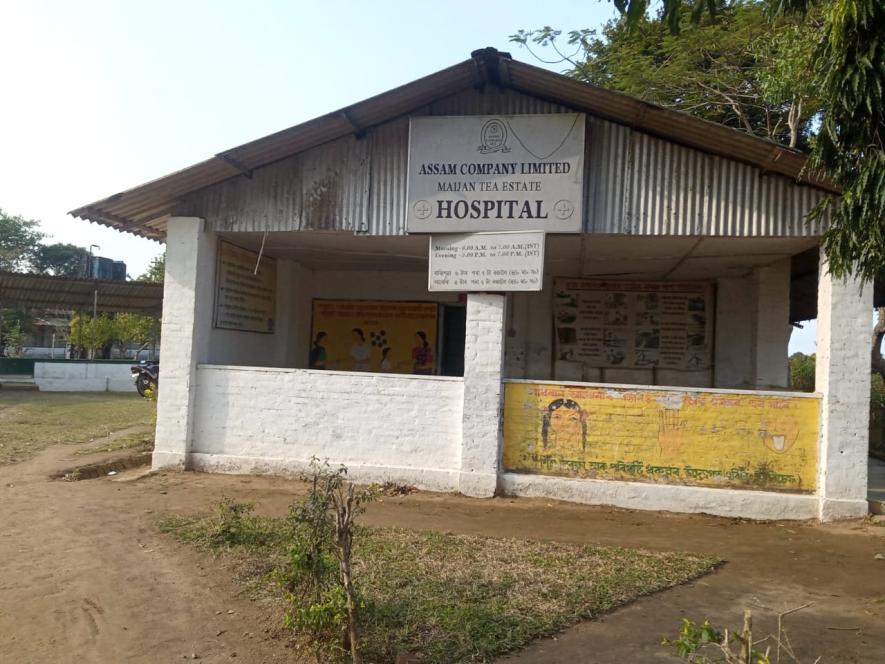
The Garden Hospital in Maijan Tea Estate, Dibrugarh.
From Behali, one can reach Dibrugarh either via Lakhimpur crossing the newly functional Bogibeel bridge or via Tezpur. In either route, the distance is above 200 kilometres. Newsclick visited the Maijan tea estate's garden hospital, which was running without doctors. The hospital has one pharmacist, one GNM and two ANM nurses. However, the hospital can admit 68 patients and has an ambulance for emergencies. The hospital caters to a population of around 7,000, said Munda. "The three divisions of the garden—Maijan, Funguni and Rajgarh--only have this hospital," he added.
During the COVID-19 waves, as usual, no special provisions were arranged for, and the severe patients were transferred to the Assam Medical College and Hospital, Dibrugarh, according to a few of the workers. However, the vaccination drives were not so bad, they said.
From Maijan, the Kenduguri tea estate is around 64 kms. The garden hospital there has a capacity of admitting 16 patients. With two nurses, a pharmacist, and a doctor, the hospital caters to around 3,000 workers. Some workers said that during the COVID-19 waves, a general CCC (Covid Care Center) was set up there. But the severe patients had to be transferred to Naharkatiya, Lengeri, or Rajgarh. However, the vaccination drives were carried out with the help of district administration and went without significant hassle.
Another large tea garden in Dibrugarh is the Tingkhong Tea Estate. Dr Atul Borgohain is servicing in the hospital there. The doctor has spent all his life providing service in the tea gardens of Assam. Dr Borgohain has also written several books about his experience in the gardens, including one that bagged a literary award in Assam. He told Newsclick, "There are nearly 875 tea gardens in Assam, and apart from the workers of these, over one a half lakhs of small tea growers constitute a population of nearly 25 lakhs. This huge population contribute to the tea economy of Assam. But their conditions remain pathetically poor."
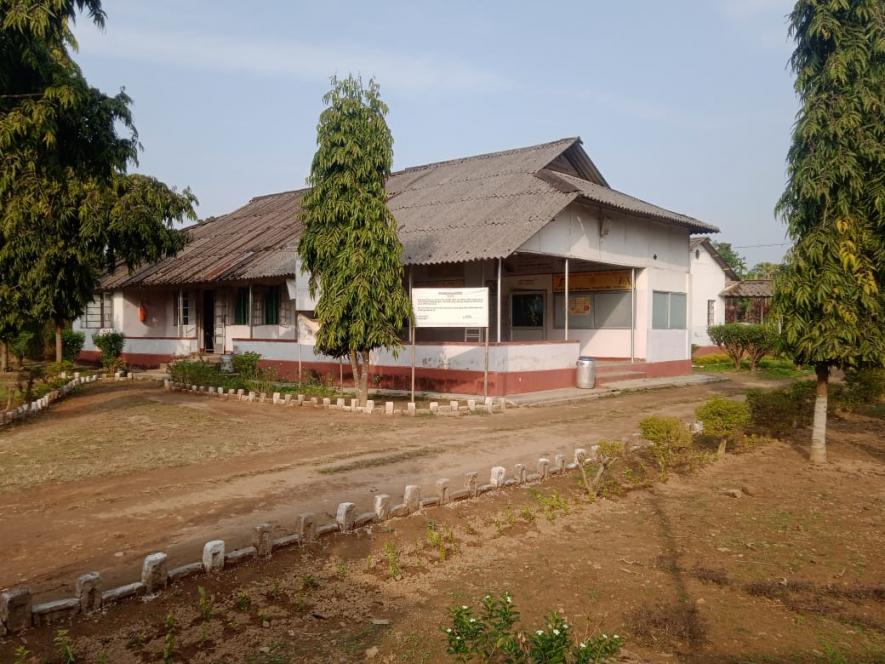
Hospital at Tingkhong Tea Estate, Dibrugarh.
Dr Borgohain discussed the long history of tea plantations in Assam dating back to 1839 during the colonial period. "The sad part is that people have not changed their mindset towards the workers. Although few ministers from the tea tribe community are there, the community suffers gross underdevelopment," he said.
Dr Borgohain said that during COVID-19 waves, he provided training in 59 tea gardens in Charaideo district on collecting samples, maintaining Covid-appropriate behaviours etc. He also noted that there still existed a vast gap of government intervention and attention to the tea garden hospitals and doctors, which needed a revamp.
Owing to the gross inadequacy of basic amenities inside the tea gardens, a good section of the youth now looks for doing something of their own.
Parimal Gore of Behali, a 37-year-old, now practices petition writing in the district court. His parents had a history of working at the Monabarie Tea Estate. Apart from his petition writing practice, his family is also involved in farming. "I could not study beyond 12th standard. In fact, most of the children inside the gardens cannot even complete matriculation, and they continue to revolve in the vicious circle. The tea gardens lack all the basic amenities," Gore told Newsclick. "The lockdowns during Covid severely impacted the youths who are aspiring to grow their own business only to come out of the juggernaut of the exploitation in gardens. Forget about any compensation for them; they were at the mercy of their own fate during the pandemic," Gore said.
“The reporter’s research was supported by a grant from Thakur Family Foundation. Thakur Family Foundation has not exercised any editorial control over the contents of this research.”
Get the latest reports & analysis with people's perspective on Protests, movements & deep analytical videos, discussions of the current affairs in your Telegram app. Subscribe to NewsClick's Telegram channel & get Real-Time updates on stories, as they get published on our website.










